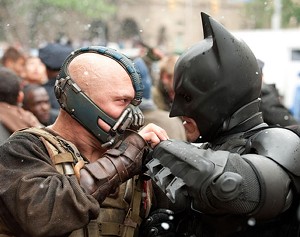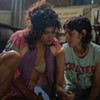Published July 25, 2012 at 10:09 a.m.
Batman Begins was a beautifully executed, hokey comic-book movie. Its sequel, The Dark Knight, was a cultural event. It played on public fears of terrorism and urban unrest, countered them with undeniable (if unsubtle) humanist convictions, and showcased an unforgettable performance. Now comes the final chapter in director Christopher Nolan’s trilogy, The Dark Knight Rises. It, too, will be remembered as a cultural event, but for tragic reasons unrelated to the images on the screen.
What is on screen is a skilled marriage of noir drama, urban nightmare and hokey comic-book stuff. While most superhero movies reach awkwardly for “epic” status — think of the heavenly choir at the climax of The Amazing Spider-Man — Nolan earns that designation by deftly orchestrating a staggering number of characters, plotlines, themes, callbacks and operatic action sequences. The movie has no slack spots, and its busyness isn’t mindless cacophony; it’s the Goodfellas of superhero flicks. Still, it may leave non-Batman fans colder than its predecessor did.
The end of The Dark Knight sent Bruce Wayne (Christian Bale) on a Christ-figure trip: By letting his vigilante alter ego take the fall for the crimes of corrupted civic leader Harvey Dent, and putting his suit in mothballs, he “perished” for Gotham’s sins. The sequel opens about eight years later, with Wayne a Howard Hughes-like recluse in his mansion, tended by the loyal Alfred (Michael Caine). But, of course, the Caped Crusader’s resurrection is imminent. A masked muscle man named Bane (Tom Hardy) is building an underclass army in the sewers, and his daring attack on the city’s stock exchange is just the start of a fiendish plan.
So Wayne dons the mask — not for his own gratification, naturally, but for our poor, malleable citizens of Gotham. (In the films’ metaphorical universe, the city stands in for America, or even the world.) There’s a strong element of antidemocratic noblesse oblige to this conceit. But Nolan counterbalances it by introducing potentially heroic representatives of the 99 percent, including John Blake (Joseph Gordon-Levitt), a young cop who idolizes Batman; and Selina Kyle (Anne Hathaway), a cat burglar struggling to escape her criminal past.
While the Passion of Batman motif is a heavy (and humorless) cross to bear, Bale acquits himself well, as do the other players. Hathaway can’t match Michelle Pfeiffer’s turn as a mousy-spinster-turned-Catwoman in Batman Returns, but she’s great fun. Bane isn’t as scary as the Joker (really, who could be?), and his mayhem initially seems like a retread. But Hardy makes him watchably bizarre: part Mad Max heavy, part H.R. Giger-esque design, part Darth Vader, part inexplicably avuncular vocal rhythms. He acts enough with his eyes to offset the inherent disadvantages of a dramatic showdown between two guys in masks.
Having squeezed topicality from themes like the corruption of the finance industry and the rage of the underclass, The Dark Knight Rises turns about and resolutely heads in a more classic comic-book direction. (Batman may not be superhuman, but his lightning-fast recovery from crippling injuries suggests otherwise.) As the movie goes on, borderline-silly moments accumulate, and readers who shun the stylization of the paneled source material may weary of the twisting plot, pounding music and constant, claustrophobic sense of menace. But, for those who are willing to give the genre its due, Nolan has crafted a surprisingly satisfying conclusion.
Some commentators, particularly those who doubt the cathartic value of violent fictions, have already drawn connections between the film’s content and the off-screen bloodshed in Colorado. Maybe their reaction is partly the fault of overeager critics, such as myself, for elevating a superhero movie into something Important. In the end, it’s just a good story, and stories can go to dark places — and emerge from them.
More By This Author
Speaking of Movies, movie Review
-

Next Month Brings the Final Curtain for Palace 9 Cinemas
Oct 27, 2023 -

Book Review: 'Save Me a Seat! A Life With Movies,' Rick Winston
Aug 30, 2023 -

Steve MacQueen Named Executive Director of Vermont International Film Festival
May 22, 2023 -

Vermonters Are Going Back to the Movies — Under the Stars
Aug 26, 2020 -

Where to Catch a Movie Near Burlington
Sep 11, 2018 - More »
Comments
Comments are closed.
From 2014-2020, Seven Days allowed readers to comment on all stories posted on our website. While we've appreciated the suggestions and insights, right now Seven Days is prioritizing our core mission — producing high-quality, responsible local journalism — over moderating online debates between readers.
To criticize, correct or praise our reporting, please send us a letter to the editor or send us a tip. We’ll check it out and report the results.
Online comments may return when we have better tech tools for managing them. Thanks for reading.












































